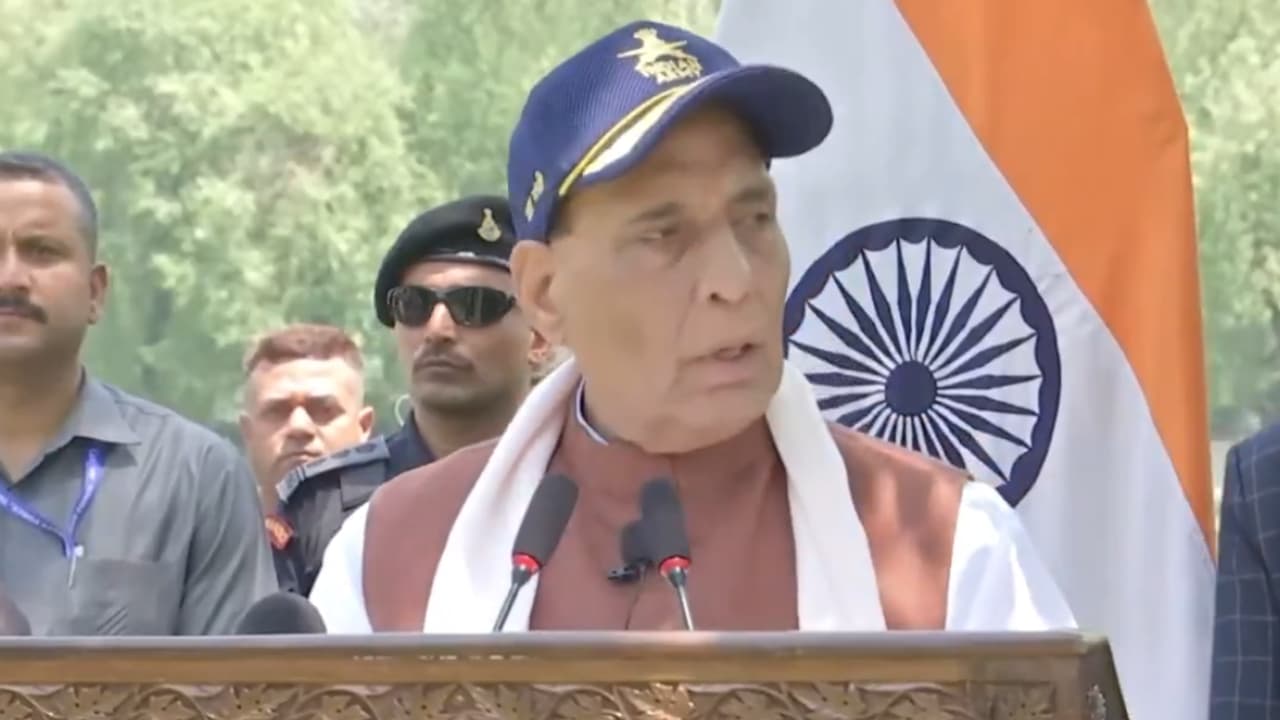Defence Minister Rajnath Singh visited Srinagar to review security and combat readiness after Operation Sindoor. He paid tribute to fallen soldiers and civilians, questioned Pakistan's nuclear security, and affirmed India's resolve against terrorism.
Defence Minister Rajnath Singh visited Srinagar, Jammu and Kashmir, on Thursday, marking his first trip to the Valley after India's Operation Sindoor. Accompanied by J&K Lieutenant Governor Manoj Sinha, Singh reviewed the overall security scenario and combat readiness of the Indian Armed Forces.

During his visit, Singh inspected Pakistani shells dropped in border areas and visited the Army's 15 Corps Headquarters, interacting with army personnel. Addressing the armed forces, Singh paid tribute to the brave jawans who fought terrorism, innocent civilians killed in Pahalgam, and injured soldiers.
"First and foremost, I bow to the supreme sacrifice made by our brave jawans in the fight against terrorism. I pay tribute to their memory. I also offer my respects to the innocent civilians who lost their lives in the Pahalgam attack. I salute the courage of the injured soldiers and pray for their swift recovery," he said while speaking at Badami Bagh Cantonment.
Singh termed Operation Sindoor a "big commitment," pointing out India's determination to end terrorism. He questioned the safety of nuclear weapons with Pakistan, stating that India would go to any extent to combat terrorism.
"I urge the IAEA and other international organizations to take control of Pakistan's nuclear facilities under their supervision. We have not cared about their nuclear blackmail. The whole world has seen how irresponsibly Pakistan has repeatedly given nuclear threats to India," Singh said, adding, "Today, from the land of Srinagar, I want to raise this question before the entire world: Are nuclear weapons safe in the hands of such an irresponsible and rogue nation? I believe that Pakistan's nuclear weapons should be taken under the surveillance of the IAEA".
This development comes after Prime Minister Narendra Modi's visit to Punjab's Adampur air base, where he interacted with soldiers. Modi delivered a strong message, reiterating India's intent to respond decisively to terror attacks.
Pakistan earlier claimed that its hypersonic missiles fired from JF-17 fighter jets destroyed India's S-400 air defence system in Adampur, a claim that was rejected by the Indian Armed Forces and it was there for everyone to see during PM Modi's visit.
Operation Sindoor, launched in response to the April 22 Pahalgam terror attack, involved 24 missile strikes across nine locations in Pakistan and Pakistan-Occupied Kashmir, killing 100 terrorists. India's new approach targets the "snake's head" – those responsible for terrorism – rather than foot soldiers.
Tensions escalated between India and Pakistan following Operation Sindoor, with multiple drone and missile attacks repelled by India. After some days of tension, Pakistan eventually called for a ceasefire, but they violated it hours later. The border has remained calm since Sunday evening with no military action reported.


